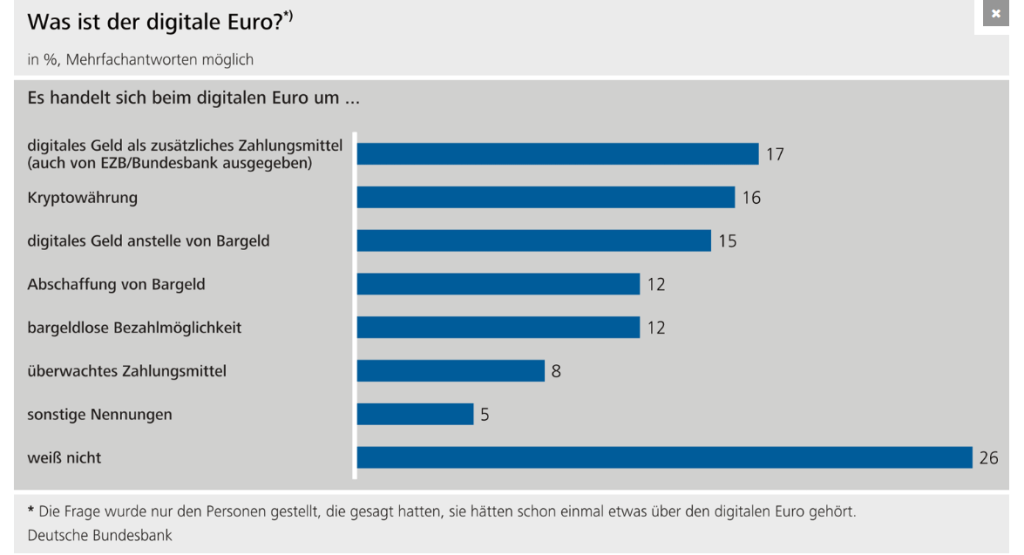A latest survey by Germany’s central financial institution, the Deutsche Bundesbank, reveals a stunning openness amongst Germans in direction of the digital euro, the European Central Financial institution’s (ECB) proposed digital foreign money. Nevertheless, the survey additionally exposes a big data hole that must be addressed earlier than the system’s potential could be absolutely realized.
Whereas a staggering three-fifths (60%) of Germans surveyed admitted to having by no means encountered details about the digital euro, half (50%) expressed a willingness to doubtlessly use it if supplied as an extra cost possibility. This openness, regardless of a scarcity of familiarity, suggests a public urge for food for innovation within the funds panorama.
Misconceptions Cloud Curiosity
Nevertheless, the survey additionally paints an image of confusion surrounding the digital euro. Practically a 3rd of respondents (30%) mistakenly believed it could change money solely, highlighting the necessity for clear and concise public schooling efforts. The ECB has repeatedly emphasised that the digital euro can be complementary to money, providing a safe and handy various for digital transactions.

Privateness emerged as the one most necessary issue for Germans contemplating the digital euro. Over three-quarters (76%) deemed robust privateness protections “very important” or “important.” This concern possible stems from the ever-present situation of knowledge privateness within the digital age. The ECB assures customers that their information will likely be far safer with the digital euro than with current business cost options.
Constructing Belief In A {Digital} Future
The survey outcomes underline the significance of complete public info campaigns, acknowledged Burkhard Balz, Bundesbank board member answerable for the digital euro mission. Balz added that beneath the present plans, individuals would be capable to make their first funds with the digital euro no sooner than 2028.
As of right now, the market cap of cryptocurrencies stood at $2.5 trillion. Chart: TradingView.com
The ECB is aiming to bridge this data hole by a multi-pronged method. Public info campaigns will clarify the idea of the digital euro, emphasizing its position as a complement to money, not a alternative. Moreover, the ECB is dedicated to constructing a system that prioritizes consumer privateness. They declare that transaction particulars will likely be identified solely to the payer and the payee, with no pointless information assortment by authorities.
Associated Studying: Elon Musk Shuts Down Crypto-Trump Talks: ‘Never Discussed Bitcoin With Him’
{Digital} Euro: The Street To 2028
Presently, the digital euro is in its preliminary section, with a deal with finalizing laws and exploring potential distribution channels. This preparation section is predicted to conclude in October 2025. Germans, and Europeans as an entire, shouldn’t anticipate using the digital euro for on a regular basis transactions till no less than 2028, in keeping with Bundesbank estimates.
Featured picture from WSBI ESBG, chart from TradingView

